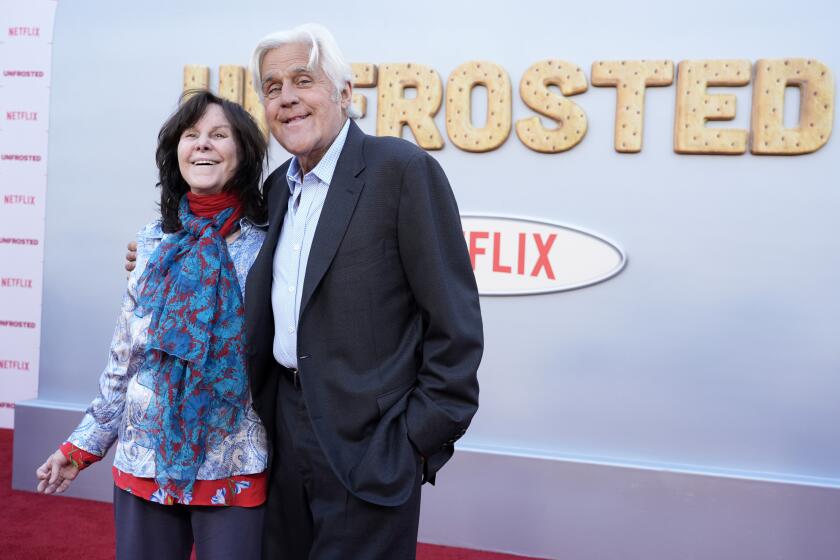Orchestra’s Andalusian fusion
- Share via
Sheikh Ahmed Zaitouni still laughs when he recalls his first attempts to play music: “My brother played a sort of two-stringed instrument we call a gimbri,” he says, speaking through a translator from the Conservatory of Tangier, Morocco. “I was 14 years old, and I used to watch how he played, and then when he was away from the house I would steal his instrument and play on it.”
There was a cafe across from his family’s house where musicians would gather to play old Moroccan styles as well as the popular songs coming in from Egypt. It was the 1940s, he was a teenager, and Zaitouni says he enjoyed it all. But what excited his deepest passion was Andalusian music, the 1,000-year-old court style of the Moorish kingdoms of southern Spain.
Today, at 78, Zaitouni is one of that style’s most respected masters. He brings his Orchestra of Tangier to UCLA on Saturday, in the first West Coast appearance by a first-rate Moroccan Andalusian group. He will play violin, accompanied by six performers on ouds (Arabic lutes), rebab (a traditional fiddle) and percussion, along with one of Morocco’s most celebrated singers, Mohamed el Arabi-Serghini.
Some Americans will already be familiar with these artists from their recordings, including the orchestra’s groundbreaking collaborations in the 1980s with the flamenco singer El Lebrijano and Serghini’s late 1990s work with the Spanish multi-instrumentalist Luis Delgado. Rather than international fusions, these were explorations of a shared past. The passionate vocals and intricate arrangements of the Andalusian style recall a time when the Mediterranean tied continents together instead of separating them; the music deeply influenced not only flamenco but the Arabic and European classical traditions.
The style was formed in the ninth century, when Ziryab, an African musician trained in the Baghdad court of Haroun al Rashid (of “Arabian Nights” fame), came to the Spanish city of Cordoba. There he composed the nuba, the musical suites that are the foundation of Arabic classical music, and over the next few centuries his followers blended his core sound with Christian and Jewish styles.
The Andalusian courts were international centers of science, philosophy and literature, and the music Zaitouni plays today was a source of the European Renaissance. For example, Serghini will sing several muwashshahat, the lyrical celebrations of love, wine and nature that inspired the French troubadours -- a word many etymologists trace to the Arabic tarab, a term for the joy or ecstasy reached through music.
Judging by an excerpt from one of the pieces on Saturday’s concert program, these lyrics are as spicily romantic as a modern pop song:
You excelled, oh night, in our union,
For God’s sake, oh night, get longer.
You did terribly, oh morning, to separate us. . . .
Apologize and do not return.
Though it was originally a music of the elite, Zaitouni says, the Andalusian style is now enjoyed by all classes of Moroccans. Indeed, it has become more accessible in recent years.
“Before, we would always play the full piece, and that could take two or even three hours,” he says. “But nowadays we also play them in short segments, and that interests everybody.”
Zaitouni insists that “you have to live in your time,” but he clearly has mixed feelings about such changes. He formed his own orchestra in 1981 with the aim of preserving the classic tradition.
“There were very few groups left that were playing in the pure Andalusian way,” he recalls. “It was getting mixed, consciously or unconsciously, with music from the Middle East. So my first concern was to make my musicians aware of the differences, and then to play in the pure way, so people could hear this music without interference from outside.”
More than a quarter-century later, he considers his mission accomplished. “I feel comfortable now with the future of this music,” he says. “I have had so many students -- one of them is now the director of this conservatory -- and I trust them to preserve and carry on my work. And for the public, I really feel that there are more and more people being attracted to this music, not only in Morocco but all around the world.
“The proof is that we are going to America,” he says. “It is a great pleasure for me to have this opportunity, to contribute in our own way to the closeness between peoples and show through our music that all cultures can coexist.”
--
(BEGIN TEXT OF INFOBOX)
Orchestra of Tangier
Where: Schoenberg Hall, UCLA campus, L.A.
When: 8 p.m. Saturday,
Price: $35
Contact: (310) 825-2101
More to Read
The biggest entertainment stories
Get our big stories about Hollywood, film, television, music, arts, culture and more right in your inbox as soon as they publish.
You may occasionally receive promotional content from the Los Angeles Times.










